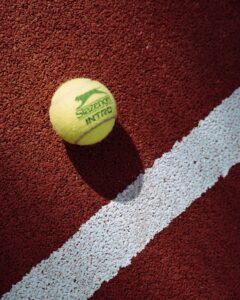Effective Strategies for Fatigue Management in Padel
3 min read
Effective Strategies for Fatigue Management in Padel
Playing padel can be an exhilarating and addictive sport. The fast-paced nature, combined with the physical demands, make it an ideal choice for those seeking an intense workout. However, as with any sport, managing fatigue in padel is crucial to prevent injuries and maintain optimal performance.
Fatigue can strike at any moment during a game of padel, causing not only a decline in performance but also increasing the risk of injuries. To ensure you stay at the top of your game, here are some effective strategies for managing fatigue in padel.
1. Proper Warm-up
Start your padel session by warming up adequately. A dynamic warm-up routine will increase blood circulation, boost your body temperature, and prepare your muscles for the intense movements ahead. Incorporate exercises like jogging, lunges, and arm swings to engage all major muscle groups.
A well-executed warm-up not only prevents injuries but also helps reduce fatigue by priming your body for the demanding physical activity to come. By increasing your core temperature and loosening up your muscles, you’ll be able to perform at your best while minimizing the impact of fatigue.
2. Hydration Is Key
Proper hydration is crucial for optimal performance and fatigue management in padel. Even a small decrease in fluid levels can have a significant impact on your energy levels and overall performance. To combat this, ensure you drink enough fluids before, during, and after your games or training sessions.
Aim to drink water or sports drinks regularly, even if you don’t feel thirsty. Listen to your body and maintain a consistent intake to keep fatigue at bay. Remember, staying hydrated helps maintain your energy levels, reduces the risk of muscle cramps, and improves your overall endurance.
3. Prioritize Rest and Recovery
Fatigue management goes beyond what you do on the court. Prioritizing sufficient rest and recovery is essential for maintaining a high level of performance and preventing injuries. Adequate sleep, along with proper nutrition, plays a crucial role in your body’s ability to recover and replenish energy stores.
Make sure to get at least 7-8 hours of sleep per night and fuel your body with nutrient-rich foods. Incorporate protein, complex carbohydrates, and healthy fats into your diet to support muscle recovery and energy production. By giving your body the proper rest and nutrients it needs, you’ll effectively manage fatigue in padel and prevent injuries.
4. Implement Interval Training
Interval training is an excellent strategy for managing fatigue in padel. By incorporating short bursts of intense activity followed by periods of rest or lower-intensity activity, you can increase your overall stamina and improve your ability to perform high-intensity movements without experiencing excessive fatigue.
Try incorporating interval training into your padel routine by alternating between short, intense rallies and longer, slower-paced ones. This will not only help improve your endurance but also simulate real-game scenarios, allowing you to manage fatigue more effectively.
5. Listen to Your Body
One of the most crucial aspects of managing fatigue in padel is listening to your body and knowing when to take breaks. Pushing through excessive fatigue can lead to injuries and setbacks, so it’s important to recognize the signs of fatigue and take the necessary rest.
If you’re feeling unusually tired, experiencing muscle weakness, or noticing a decline in your performance, it’s time to take a break. Resting during moments of fatigue not only prevents injuries but also allows your body to recover and recharge for future games.
By implementing these effective strategies for managing fatigue in padel, you’ll be able to prevent injuries, maintain optimal performance, and enjoy the game to its fullest. Remember, fatigue management is not a one-size-fits-all approach, so feel free to tailor these strategies to your individual needs and preferences. Stay hydrated, prioritize rest, and listen to your body for a rewarding and injury-free padel experience.






